When our canine companions are feeling under the weather, their appetite often takes a hit. Just like humans, dogs may go off their regular food when experiencing an upset stomach or general malaise. Providing nutritious food is paramount during these times to support their recovery and boost energy levels. This guide, in partnership with We Love Doodles, explores the best foods for dogs with upset stomachs and offers insights into suitable options for those with allergies or a predisposition to digestive issues.
What to Feed a Sick Dog
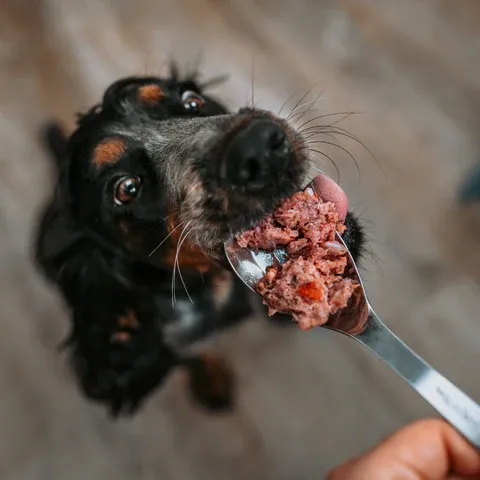 Food for dogs
Food for dogs
It’s understandable to worry about your dog’s diet when they’re unwell. A bland, easily digestible, and nutritious diet is generally recommended for dogs experiencing stomach upset. Having healthy, readily available options can make a significant difference in helping your furry friend recover. However, persistent illness warrants a consultation with your veterinarian. Here are ten beneficial foods to consider:
1. Boiled White Meat
 Chihuahua
Chihuahua
Plain white meats like chicken or turkey are excellent choices for sick dogs due to their digestibility and low fat content. Chicken or turkey breast offers lean protein that can help settle an upset stomach. Ensure all skin and bones are removed to prevent choking hazards and ease digestion. To prepare:
- Rinse the meat thoroughly.
- Trim excess fat, skin, and bones.
- Boil the meat in water for 15-20 minutes.
- Drain, cut into small, digestible pieces, and allow to cool before serving.
2. White Rice
White and brown rice are common components in dog food and can be beneficial when your dog is unwell. While brown rice is more nutritious, white rice’s blandness makes it a gentler option for sensitive stomachs. It can also help firm up stools in cases of diarrhea. To cook:
- Rinse the rice.
- Combine rice and water (two parts water to one part rice) in a pan.
- Add a pinch of salt, bring to a boil, then simmer for approximately 18 minutes until water is absorbed.
- Let it cool and fluff before serving.
3. Sweet Potatoes
Cooked, plain sweet potatoes are rich in fiber and vitamins, making them gentle on a dog’s digestive system and aiding in soothing stomach and intestinal issues. They also provide essential minerals like calcium and iron. Avoid feeding raw sweet potatoes, as they are harder to digest. Peel, chop, boil until soft, mash, and serve once cooled.
 Sweet potato slices on a table
Sweet potato slices on a table
4. Pumpkin
Similar to sweet potatoes, pumpkin is effective for alleviating an upset stomach. Its vitamin content supports the immune system, and its fiber aids digestion. Offer a few tablespoons of plain, canned pumpkin (ensure no added sugars or seasonings) with your dog’s meal to aid their recovery.
 Husky with a pumpkin slice smile
Husky with a pumpkin slice smile
5. Homemade Bone Broth
Bone broth is a nutritious option that provides essential minerals like sodium and potassium, also aiding hydration. It’s low in carbohydrates and gentle on the stomach. To prepare, simmer marrow bones (beef, pork, chicken, or turkey) in water for 20-24 hours. Strain the liquid and serve. Avoid adding garlic or excessive salt.
 Puppy licks it
Puppy licks it
6. Baby Food
Stage 2 meat-based baby foods (chicken, lamb, turkey) can be a digestible option for puppies with stomach issues. Always check for and avoid ingredients toxic to dogs, such as garlic or onion powder. Consult your vet if you are uncertain about ingredients.
 Doodle puppies eat from a plate
Doodle puppies eat from a plate
7. Fish
Fish is a valuable source of healthy fats and vitamins that can benefit a sick dog’s immune system. Its strong aroma can also entice a reluctant eater. Poaching fish and removing all bones before cutting it into small pieces is the recommended preparation method.
8. Oatmeal
Plain, cooked oatmeal is high in fiber and antioxidants, which can help soothe an upset stomach and reduce inflammation. However, feed in moderation, as excessive fiber can worsen digestive discomfort.
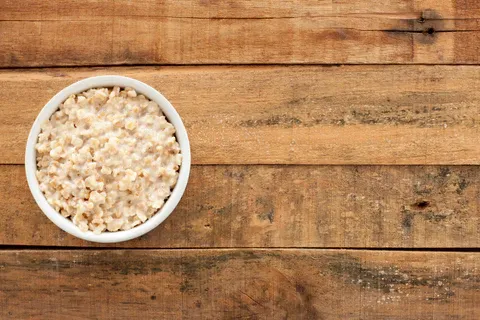 A bowl of oatmeal on a wooden tabel
A bowl of oatmeal on a wooden tabel
9. Yogurt
Plain, natural yogurt containing probiotics and free from sweeteners can aid digestion and support gut health. It’s particularly helpful for constipation. This can be sourced easily and even frozen for a cooling treat.
 Puppy with yoghurt in its beard
Puppy with yoghurt in its beard
10. Eggs
If your dog is not vomiting, eggs offer a gentle source of protein and can help boost energy levels. Scrambled (without butter or oil) or boiled eggs are the best preparation methods. Avoid eggs if your dog is actively vomiting.
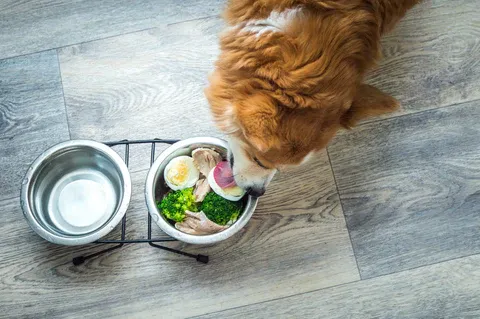 Dog eats eggs and vegetables from its bowl
Dog eats eggs and vegetables from its bowl
What to Feed a Dog with Allergies
If your dog frequently experiences stomach upset, consult your veterinarian to rule out food-related or breed-specific allergies. For dogs with sensitive stomachs, alternatives to regular kibble may be beneficial.
Cold Pressed Dog Food
Cold pressed dog food is processed at lower temperatures than traditional kibble, retaining more nutritional value. Its easily digestible nature makes it ideal for sensitive stomachs and aids in digestion, similar to raw food. Wilsons Pet Food offers various flavors, including options for dogs with grain-related allergies.
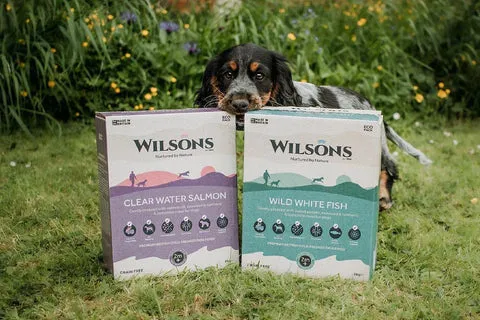
Insect Protein Cold Pressed Dog Food
This option is nutritionally balanced and processed similarly to meat-based cold-pressed food. Insects are a high-protein, hypoallergenic source of nutrients, ideal for dogs with meat sensitivities or allergies.
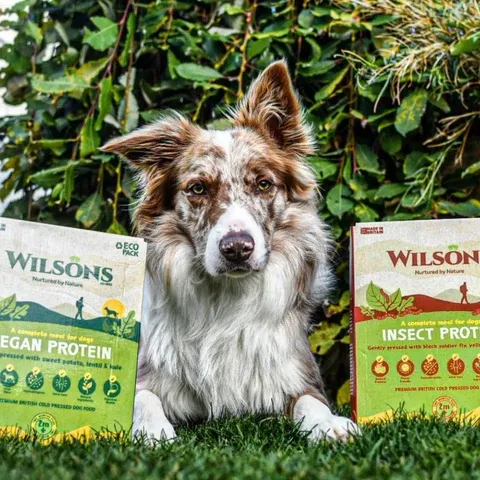 Collie dog with Wilsons Insect Protein Food
Collie dog with Wilsons Insect Protein Food
Raw Frozen Dog Food
Minimally processed and grain-free, raw food can improve digestion, skin, and coat health. Wilsons offers various raw food options, including meat, offal, and bone mixes, with added vitamins and minerals to cater to specific dietary needs and allergies.
 Dougal eating raw and cold pressed food
Dougal eating raw and cold pressed food
Explore Tummy-Friendly Options at Wilsons Pet Food
Discover Wilsons Pet Food’s range of specialized foods designed for sensitive stomachs. Consider their sample packs to let your dog try before committing. Additionally, explore their natural dog treats for nutritious additions to your dog’s diet.
Related Posts:
- Gentle and Natural Dog Food
- The Perfect Puppy Food
- Benefits of Grain-Free Dog Food
